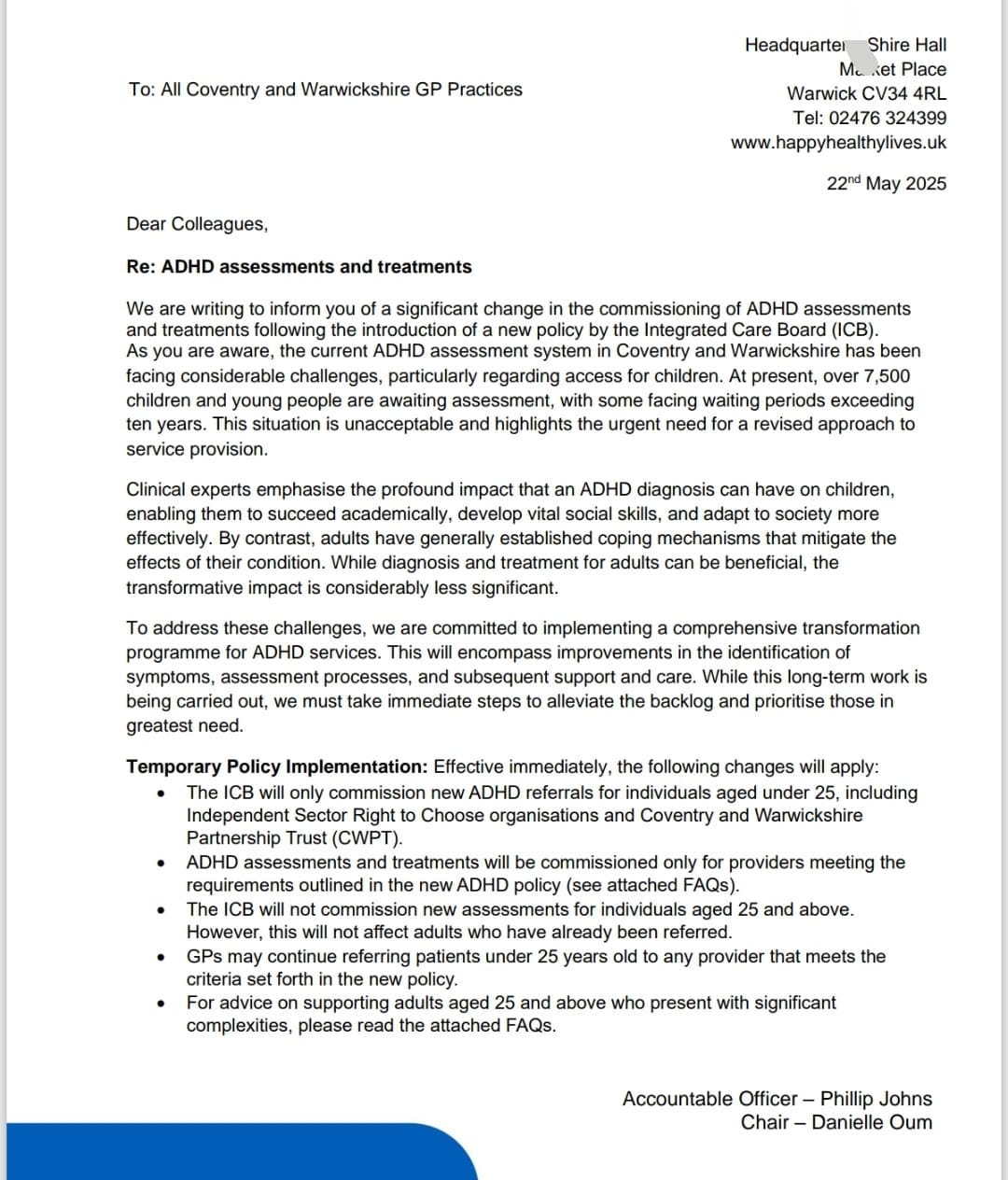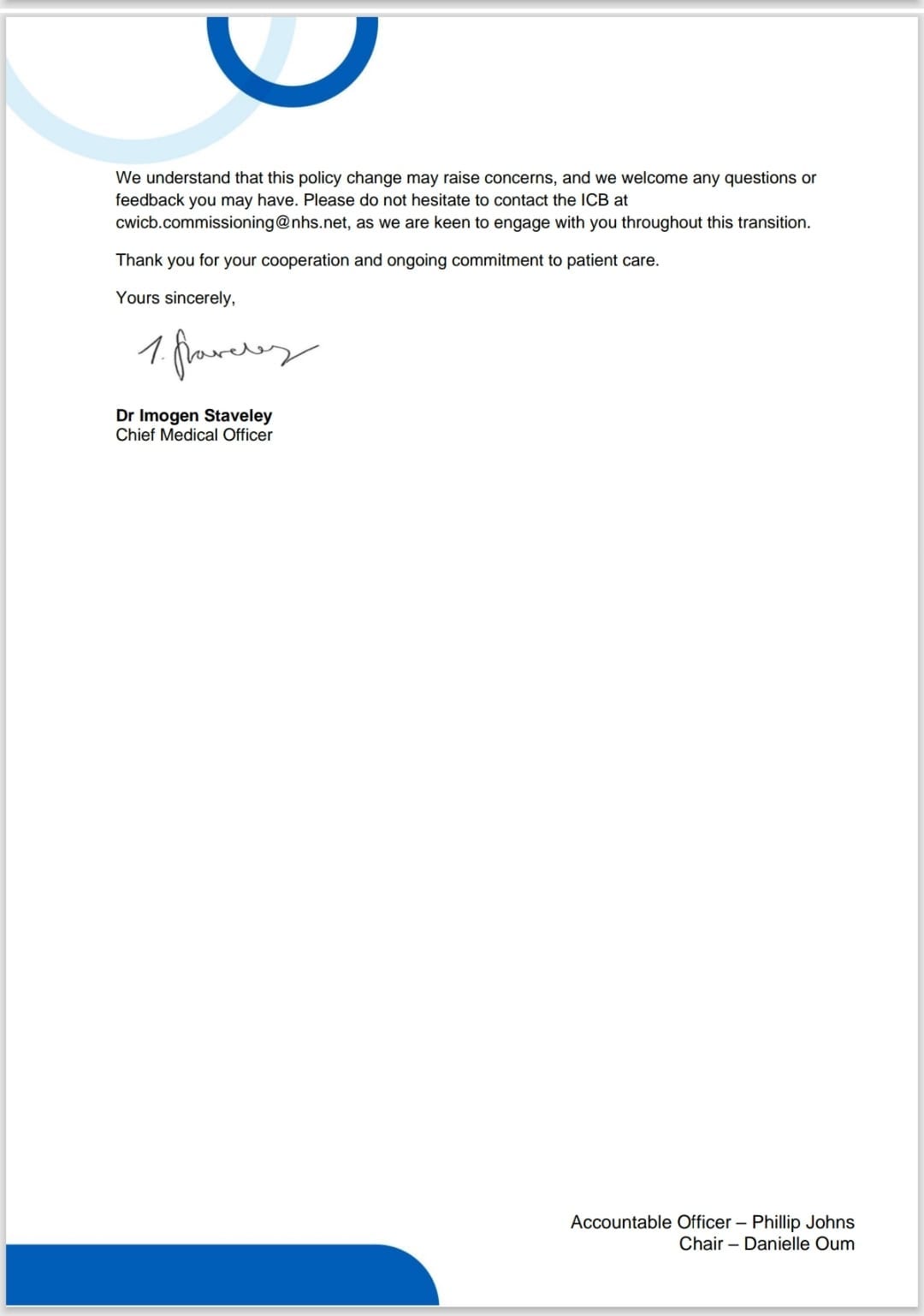Abandoned at 25: The Quiet Ejection of Adults from ADHD ServicesServices in Coventry and Warwickshire Will No Longer Refer Adults Over 25On May 22nd, 2025, Coventry and Warwickshire Integrated Care Board (ICB) released a letter that effectively cuts off ADHD assessments and treatment referrals for individuals aged 25 and over. Disguised as a “temporary policy” to address service backlogs, this decision quietly enacts the systemic abandonment of neurodivergent adults— particularly those who were failed by the very systems that now claim they’ve “established coping mechanisms.” Let us be clear: this policy is not about triage. It is about exclusion. Over 7,500 children and young people are reportedly waiting for ADHD assessment in the region. In response, the ICB has chosen to suspend adult referrals, arguing that the benefit of diagnosis and treatment is less significant for those over 25. But this logic fundamentally misunderstands both the purpose and impact of late diagnosis for adults— particularly AuDHD (Autistic & ADHD) adults whose experiences have been consistently erased or misinterpreted by services (Munday et al., 2025). As I wrote in Unusual Medicine, and reiterated in my guidance for educators, Autistic in School, the medical model of neurodivergence is insufficient for capturing the complex, chaotic, and emergent ways that Autistic and ADHD experiences manifest. Many of us reach adulthood not only undiagnosed but misdiagnosed— our distress framed as personality disorder, our sensory overload seen as anxiety, our executive dysfunction mistaken for laziness. Before I explore the deeper implications of this move, it's important to see what was actually said. (Alt Text After The Subscribe Button On This Post) Accurate diagnosis in adulthood can be life-saving. The Right to Choose— one of the last viable pathways to adult diagnosis— has now been limited to under-25s. This is not just gatekeeping. It is age-based discrimination under the guise of resource management. And it compounds the structural injustice experienced by adults who were never given the opportunity to be recognised as neurodivergent children in the first place. As I argued in The New Normal, diagnosis is not the endpoint— it’s the doorway to language, community, and survival. But when access is denied, especially for those navigating multiple marginalisations (such as trauma, substance use, or poverty), the effects are devastating. We explored this extensively in our research on substance use and autism, where participants described years of clinical invalidation and delayed recognition. The system only noticed them once they were in crisis. This new policy ensures that more people will be left to reach that crisis point before help is even considered. Once systems are restructured around exclusion, that exclusion becomes the new default. The ICB letter frames this shift as “temporary,” but history teaches us that once services are restricted, they rarely return to previous levels. And when neurodivergent people are forced to “cope” in silence, without diagnosis or support, the result is not resilience— it is suffering, invisibility, and harm. Leaving adults with unrecognised ADHD does not honour the fact that they are equally deserving of care. We must resist the idea that being over 25 makes your needs irrelevant. The email provided in the letter to raise concerns is cwicb.commissioning@nhs.net Full Text From Letter:
You're currently a free subscriber to David Gray-Hammond. For the full experience, upgrade your subscription. |
Thursday, 5 June 2025
Abandoned at 25: The Quiet Ejection of Adults from ADHD Services
Subscribe to:
Post Comments (Atom)
We've Been Thinking About Mental Health All Wrong...
The Ecosystemic Model Explained ͏ ͏ ͏ ͏ ͏ ͏ ͏ ͏ ͏ ͏ ͏ ͏ ͏ ͏ ͏ ͏ ...
-
Online & In-Person ͏ ͏ ͏ ͏ ͏ ͏ ͏ ͏ ͏ ͏ ͏ ͏ ͏ ͏ ͏ ͏ ͏ ...
-
Dear Reader, To read this week's post, click here: https://teachingtenets.wordpress.com/2025/07/02/aphorism-24-take-care-of-your-teach...



No comments:
Post a Comment